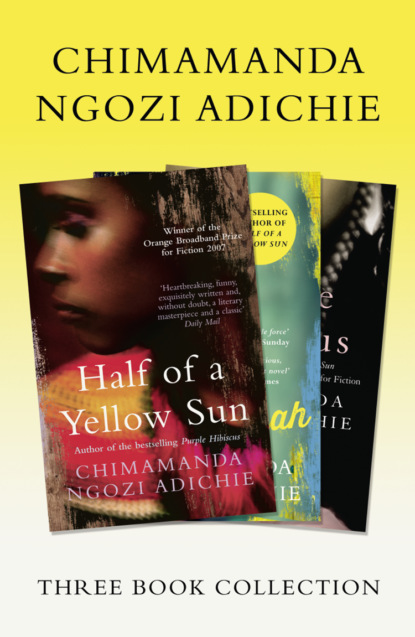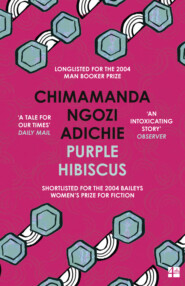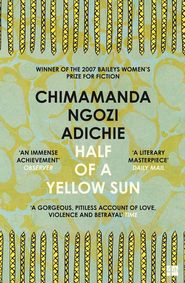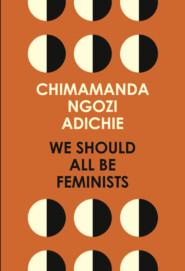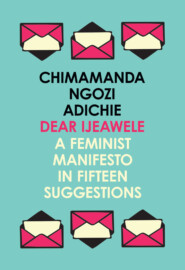По всем вопросам обращайтесь на: info@litportal.ru
(©) 2003-2024.
✖
Half of a Yellow Sun, Americanah, Purple Hibiscus: Chimamanda Ngozi Adichie Three-Book Collection
Автор
Год написания книги
2018
Настройки чтения
Размер шрифта
Высота строк
Поля
‘Touch me.’ She knew he didn’t want to, that he touched her breasts because he would do whatever she wanted, whatever would make her better. She caressed his neck, buried her fingers in his dense hair, and when he slid into her, she thought about Arize’s pregnant belly, how easily it must have broken, skin stretched that taut. She started to cry.
‘Nkem, don’t cry.’ Odenigbo had stopped; he was lying next to her and smoothing her forehead. Later, when he gave her more pills and some water, she took them dutifully and then lay back and waited for the strange stillness they brought.
Ugwu’s gentle knock woke her up; he would open the door and come in with a tray of food that he would place next to her packets of medicine, bottle of Lucozade, and tin of glucose. She remembered the first week she came back, the week that Odenigbo sprang up whenever she stirred. She had asked for water and Odenigbo opened the bedroom door to go to the kitchen and nearly tripped on Ugwu, curled on a mat right outside their door. ‘My good man, what are you doing here?’ he asked, and Ugwu answered, ‘You don’t know where anything is in the kitchen, sah.’
She closed her eyes now and pretended she was asleep. He was standing close to her and watching her; she could hear his breathing.
‘When you are ready, mah, the food is here,’ he said. Olanna nearly laughed; he probably knew all the times she pretended to be asleep when he brought her food. She opened her eyes. ‘What did you cook?’
‘Jollof rice.’ He raised the cover of the dish. ‘I used fresh tomatoes from the garden.’
‘Has Baby eaten?’
‘Yes, mah. She is playing outside with Dr Okeke’s children.’
Olanna picked up the fork and held it.
‘I will make fruit salad for you tomorrow, mah. That pawpaw tree behind has a ripe fruit. I will give it one more day, and then I will pluck it fast before those birds come for it. I will use orange and milk.’
‘Good.’
Ugwu still stood there, and she knew he would not leave until she had started to eat. She raised the fork to her mouth slowly, chewing with her eyes closed. It was as good as whatever Ugwu cooked, she was sure, but, except for the chalky pills, she had been unable to taste anything in so long. Finally, she drank some water and asked Ugwu to take the tray away.
On her bedside table, Odenigbo had placed a long sheet of paper with WE, UNIVERSITY STAFF, DEMAND SECESSION AS A MEANS OF SECURITY typewritten at the top and a patchwork of varied signatures at the bottom.
‘I was waiting for you to be strong enough to sign it before I deliver it to the statehouse in Enugu,’ he had said.
After Ugwu left the room, she picked up a pen and signed the letter and then checked through the text for any errors. There were none. But Odenigbo didn’t need to deliver the letter because the secession was announced that evening. He sat on the bed with the radio placed on the bedside cabinet. The reception had little static, as if the radio waves understood the importance of the speech. Ojukwu’s voice was unmistakable; it was vibrantly male, charismatic, smooth:
Fellow countrymen and women, you the people of Eastern Nigeria:Conscious of the supreme authority of Almighty God over allmankind; of your duty over posterity; aware that you can nolonger be protected in your lives and in your property by any governmentbased outside Eastern Nigeria; determined to dissolveall political and other ties between you and the former Republic ofNigeria; having mandated me to proclaim on your behalf and inyour name that Eastern Nigeria be a sovereign independentRepublic, now therefore I do hereby solemnly proclaim that theterritory and region known as and called Eastern Nigeria,together with her continental shelf and territorial waters, shallhenceforth be an independent sovereign state of the name and titleof The Republic Of Biafra.
‘This is our beginning,’ Odenigbo said. That false softness had left his voice and he sounded normal again, bracing and sonorous. He took his glasses off and grabbed Baby’s little hands and began to dance around in circles with her. Olanna laughed and then felt as if she were following a script, as if Odenigbo’s excitement would abide nothing but more excitement. She sat up and shivered. She had wanted the secession to happen, but now it seemed too big to conceive. Odenigbo and Baby were moving round and round, Odenigbo singing off-key, a song he had made up – ‘This is our beginning, oh, yes,our beginning, oh, yes …’ – while Baby laughed in blissful incomprehension. Olanna watched them, her mind frozen in the present, on the cashew-juice stain on the front of Baby’s dress.
The rally was held in Freedom Square, in the centre of the campus, lecturers and students shouting and singing, an endless sheet of heads and placards held high.
We shall not, we shall never move,
Just like a tree that’s planted by the water,
We shall not be moved.
Ojukwu is behind us, we shall never move.
God is behind us, we shall never move.
They swayed as they sang, and Olanna imagined that the mango and gmelina trees swayed too, in agreement, in one fluid arc. The sun felt like a flame brought too close, and yet it was drizzling and the lukewarm raindrops mixed with her sweat. Her arm brushed Odenigbo’s as she raised her placard: it read WE CANNOT DIE LIKE DOGS. Baby was sitting on Odenigbo’s shoulders, waving her stuffed doll, and the sun was bright through the thin drizzle, and Olanna was filled with a delicious exuberance. Ugwu was beside her. His placard read god bless biafra. They were Biafrans. She was Biafran. Behind her, a man was talking about the market, how the traders were dancing to Congo music and giving away the best of their mangoes and groundnuts. A woman said she would go there right after the rally to see what she could get for free, and Olanna turned to them and laughed.
A student leader spoke into the microphone and the singing stopped. Some young men were carrying a coffin with NIGERIA written on it in white chalk; they raised it up, mock solemnity on their faces. Then they placed it down and pulled their shirts off and started to dig a shallow hole in the ground. When they lowered the coffin into the hole, a cheer rose in the crowd and spread, ripplelike, until it was one cheer, until Olanna felt that everybody there had become one. Somebody shouted, ‘Odenigbo!’ And it spread among the students. ‘Odenigbo! Address us!’
Odenigbo climbed up to the podium waving his Biafran flag: swaths of red, black, and green and, at the centre, a luminous half of a yellow sun.
‘Biafra is born! We will lead Black Africa! We will live in security! Nobody will ever again attack us! Never again!’
Odenigbo raised his arm as he spoke, and Olanna thought how awkwardly twisted Aunty Ifeka’s arm had looked, as she lay on the ground, how her blood had pooled so thick that it looked like glue, not red but close to black. Perhaps Aunty Ifeka could see this rally now, and all the people here, or perhaps not, if death was a silent opaqueness. Olanna shook her head, to shake away the thoughts, and took Baby from Ugwu’s neck and hugged her close.
After the rally, she and Odenigbo drove to the staff club. Students had gathered on the hockey field nearby, burning paper effigies of Gowon around a glowing bonfire; the smoke curled into the night air and mixed with their laughter and chatter. Olanna watched them and realized with a sweet surge that they all felt what she felt, what Odenigbo felt, as though it were liquid steel instead of blood that flowed through their veins, as though they could stand barefoot over red-hot embers.
14 (#u3c1576f1-c916-57b7-bb43-a63c028a7109)
Richard did not think it would be so easy to find Nnaemeka’s family, but when he arrived at Obosi and stopped at the Anglican church to ask, the catechist told him they lived just down the road, in the unpainted house flanked by palm trees. Nnaemeka’s father was small and albino, copper-coloured, his eyes a greyish-hazel that brightened as soon as Richard spoke Igbo. He was so different from the large, dark customs officer at the airport that for a moment Richard wondered if perhaps he was in the wrong house and this was not Nnaemeka’s father. But the older man blessed the kola nut in a voice so similar to Nnaemeka’s that it took Richard back to the airport lounge that hot afternoon and to Nnaemeka’s irritating chatter before the door burst open and the soldiers ran in.
‘He who brings the kola nut brings life. You and yours will live, and I and mine will live. Let the eagle perch and let the dove perch and, if either decrees that the other not perch, it will not be well for him. May God bless this kola in Jesus’ name.’
‘Amen,’ Richard said. He could see other resemblances now. The man’s gestures as he broke the kola nut apart into five lobes were eerily like Nnaemeka’s, as was the set of his mouth, with the lower lip jutting out. Richard waited until they had chewed the kola nut, until Nnaemeka’s mother appeared, dressed in black, before he said, ‘I saw your son at the airport in Kano, the day it happened. We talked for a while. He spoke about you and his family.’ Richard paused and wondered whether they would prefer to hear that their son had remained stoic in the face of death or if they would want to hear that he fought it, that he charged towards the gun. ‘He told me that his grandmother from Umunnachi was a respected herbal doctor known far and wide for her cure of malaria, and that it was because of her that he first wanted to be a doctor.’
‘Yes, that is so,’ Nnaemeka’s mother said.
‘He spoke only good words about his family,’ Richard said. He chose his Igbo words carefully.
‘Of course he would speak good words about his family.’ Nnaemeka’s father gave Richard a long look as if he did not understand why Richard had to say what they already knew.
Richard shifted on the bench. ‘Did you have a funeral?’ he asked, and then wished he had not.
‘Yes,’ Nnaemeka’s father said; he fixed his gaze on the enamel bowl that held the last lobe of kola nut. ‘We waited for him to return from the North and he did not return, so we had a funeral. We buried an empty coffin.’
‘It was not empty,’ Nnaemeka’s mother said. ‘Did we not put that old book he used to read for the civil service exam inside?’
They sat in silence. Dust motes swam in the slice of sunlight that came through the window.
‘You must take the last piece of kola nut with you,’ Nnaemeka’s father said.
‘Thank you.’ Richard slipped the lobe into his pocket.
‘Shall I send the children to the car?’ Nnaemeka’s mother asked. It was difficult to tell what she looked like, with the black scarf that covered all of her hair and much of her forehead.
‘The car?’ Richard asked.
‘Yes. Did you not bring us things?’
Richard shook his head. He should have brought yams and drinks. It was after all a condolence visit, and he knew how things were done. He had been caught up in himself, in thinking that his coming was enough, that he would be the magnanimous angel who brought the last hours of their son to them and, by doing so, would assuage their grief and redeem himself. But to them he was just like any other person who had come to pay condolences. His visit made no difference to the only reality that mattered: their son was gone.
He got up to leave, knowing that nothing had changed for him either; he would feel the same way he had felt since he returned from Kano. He had often wished that he would lose his mind, or that his memory would suppress itself, but instead everything took on a terrible transparence and he had only to close his eyes to see the freshly dead bodies on the floor of the airport and to recall the pitch of the screams. His mind remained lucid. Lucid enough for him to write calm replies to Aunt Elizabeth’s frantic letters and tell her that he was fine and did not plan to return to England, to ask her to please stop sending flimsy airmail editions of newspapers with articles about the Nigerian pogroms circled in pencil. The articles annoyed him. ‘Ancient tribal hatreds’, the Herald wrote, was the reason for the massacres. Time magazine titled its piece man must whack, an expression printed on a Nigerian lorry, but the writer had taken whack literally and gone on to explain that Nigerians were so naturally prone to violence that they even wrote about the necessity of it on their passenger lorries. Richard sent a terse letter off to Time. In Nigerian Pidgin English, he wrote, whack meant eat. At least the Observer was a little more adroit, in writing that if Nigeria survived the massacres of the Igbo, it would survive anything. But there was a hollowness to all the accounts, an echo of unreality. So Richard began to write a long article about the massacres. He sat at the dining table in Kainene’s house and wrote on long sheets of unlined paper. He had brought Harrison to Port Harcourt, and while he worked he could hear Harrison talking to Ikejide and Sebastian. ‘You are not knowing how to bake German chocolate cake?’ A cackle. ‘You are not knowing what is rhubarb crumble?’ Another scornful cackle.
Richard started by writing about the refugee problem, a result of the massacres, about the traders who fled their markets in the North, university lecturers who left their campuses, civil servants who fled their jobs in the ministries. He struggled over the closing paragraph.
It is imperative to remember that the first time the Igbo peoplewere massacred, albeit on a much smaller scale than what hasrecently occurred, was in 1945. That carnage was precipitated bythe British colonial government when it blamed the Igbo peoplefor the national strike, banned Igbo-published newspapers, andgenerally encouraged anti-Igbo sentiment. The notion of therecent killings being the product of ‘age-old’ hatred is thereforemisleading. The tribes of the North and the South have long hadcontact, at least as far back as the ninth century, as some of themagnificent beads discovered at the historic Igbo-Ukwu siteattest. No doubt these groups also fought wars and slave-raidedeach other, but they did not massacre in this manner. If this ishatred, then it is very young. It has been caused, simply, by theinformal divide-and-rule policies of the British colonial exercise.These policies manipulated the differences between the tribes andensured that unity would not exist, thereby making the easy governance of such a large country practicable.
When he gave Kainene the article, she read it carefully, with her eyes narrowed, and afterwards told him, ‘Very fierce’.





